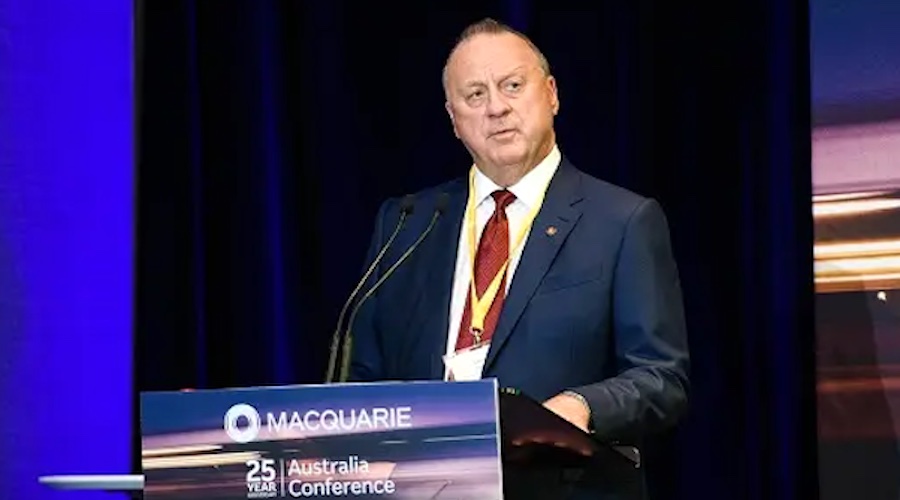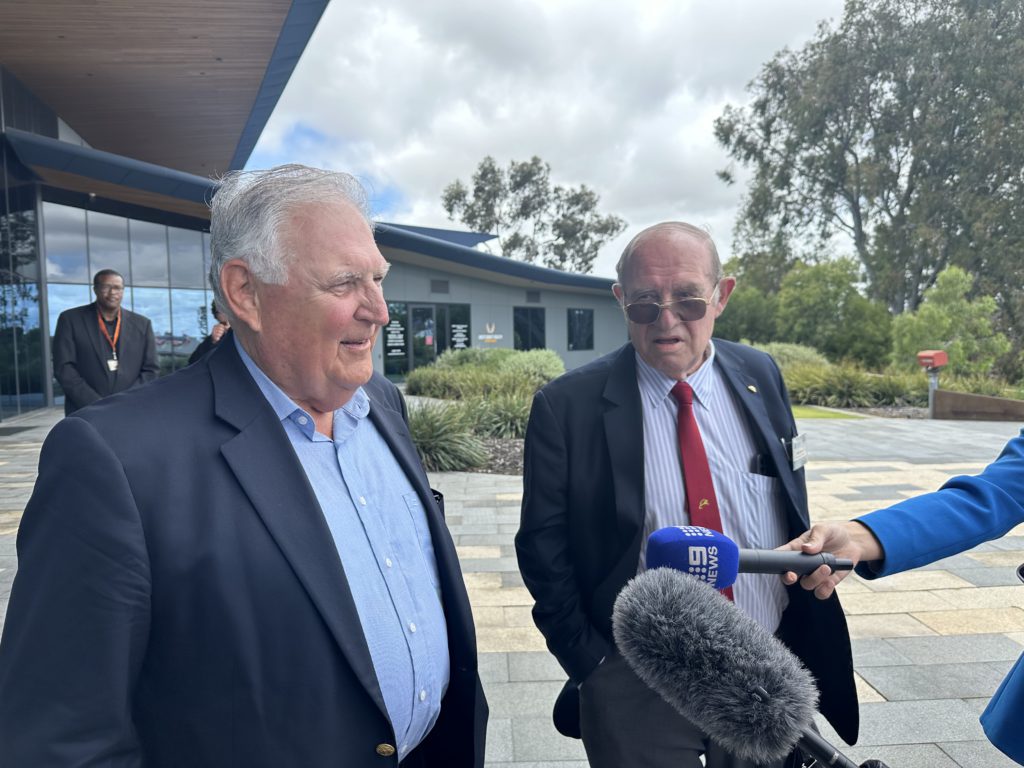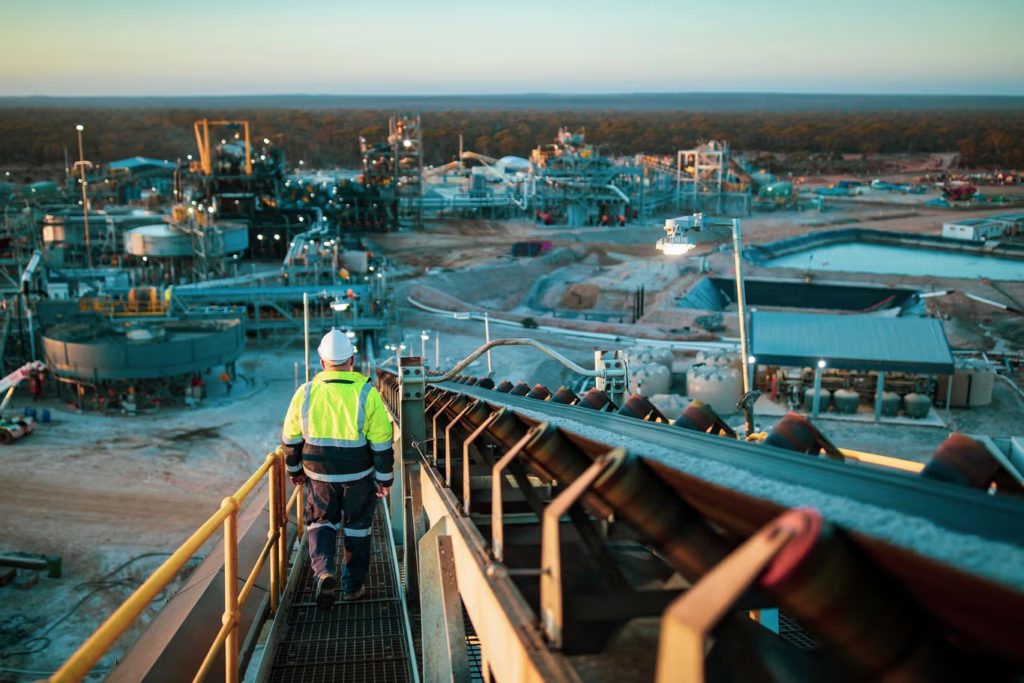Australian pension group rejects Mineral Resources pay proposal
Beleaguered Ellison faces MinRes shareholders
Kristie Batten | November 21, 2024

Chris Ellison. (Image courtesy of Macquarie Australia | MinRes.)
Chris Ellison, founder and CEO of the embattled mining and contractor Mineral Resources (ASX: MIN), broke his silence Thursday following a governance scandal that erupted last month.

Earlier this month, MinRes announced that Ellison would step down within 12–18 months. This decision followed an investigation that uncovered tax evasion and other misconduct, including allegations that he used company resources for personal gain and leased properties to the company in which he had a financial interest.
The company’s annual general meeting (AGM) in Perth on Thursday drew significant anticipation. Television crews and photographers gathered outside the venue hours before its scheduled start, aiming to capture Ellison’s arrival.
More than 300 people attended the meeting, with some relegated to an overflow area outside the main room.
Following an address by MinRes chairman James McClements—who is also set to leave the company—Ellison spoke for about four minutes, addressing the scandal.
He admitted to an “error of judgment” in relation to tax evasion and assured shareholders that all personal expenses had always been reimbursed promptly.
“I deeply regret the impact this has had on the business and our people,” Ellison said.
“I can’t stress enough how much I hate what I’ve done, and there’s a dark cloud in my life that I’ll live with forever.”
Ellison highlighted his 32-year tenure with MinRes, during which he had focused on building a successful Australian company.
“My focus has been on building a great Australian company, and I’m proud of the value we’ve created,” he said.
Ellison followed his apology with a 30-minute presentation detailing the company’s operations, which include iron ore and lithium mines, as well as its status as the world’s largest crushing contractor.
He emphasized future growth opportunities and MinRes’ contributions to the Western Australian resources sector, including its covid-19 testing efforts, initiatives to boost female and Indigenous employment, and a strong track record of shareholder returns.
Tension builds
When the meeting turned to formal business, the atmosphere grew tense.
Before shareholder questions began, McClements urged attendees to remain respectful during a time of “heightened emotions.”
Over the next hour, more than 40 questions were posed, primarily focusing on the timing and disclosure of the governance issues. Topics like the company’s growth outlook and balance sheet took a backseat.
MinRes had previously admitted it was aware of some of the issues as early as 2022 but considered them immaterial to the company’s share price at the time.
Several shareholders expressed frustration that allegations first surfaced in the media instead of being disclosed by the company.
“Investigations have evolved over time to address allegations in the media and from other sources,” McClements said.
“We’ve had processes in place to disclose material information as it emerged. However, recent media reports didn’t necessarily align with our understanding of these matters.”
Despite many questions being directed at Ellison, McClements fielded all inquiries, often referring shareholders back to the company’s November 4 statement.
Ellison declined to speak to the media after the AGM, a departure from his usual practice.
Unexpected support
The company’s remuneration report received only 25.4% shareholder support, resulting in a first “strike.” A second strike at next year’s AGM could trigger a board spill resolution.
However, it became evident that many shareholders opposed Ellison’s impending departure.
Numerous attendees voiced their support for Ellison, receiving enthusiastic applause.
Long-time shareholder David Bowden lauded MinRes’ “impeccable financial performance” since its 2006 listing and criticized the “trial by media” that he said led to Ellison’s downfall.
Shareholder Jan Ford described Ellison as an inspiration, arguing he was the right person to lead the company.
Even prominent activist shareholder Stephen Mayne praised Ellison for retaining his significant stake in MinRes. Ellison remains the company’s largest shareholder, holding over 11% of the company—valued at nearly A$800 million ($521m).

Bloomberg News | November 20, 2024 |

Mt Marion lithium operation. Credit: Mineral Resources
A group representing Australia’s A$3.9 trillion ($2.5 trillion) pension industry has recommended its members vote against the remuneration plan of scandal-hit Mineral Resources Ltd. at the company’s annual general meeting on Thursday.

The Australian Council of Superannuation Investors wants to clarify what directors knew about Mineral Resources’ investment in industrial property that was part-owned by managing director Chris Ellison. The Perth-based miner bought 49% of a company linked to Ellison that owned the property, the Australian Financial Review reported last week, the latest in a series of scandals that has seen the company lose more than half its value from a peak in May.
“Investors want to know who signed off on that transaction,” ASCI’s executive manager of stewardship Ed John said in an emailed statement. “The board must respond on this issue before the AGM.”
Ellison has been under scrutiny after the company that he founded launched an internal inquiry into what the board described as “profoundly disappointing” conduct. Separate investigations were launched by the Australian Securities and Investments Commission, the corporate watchdog, as well as the Australian Securities Exchange.
One of Australia’s largest pension funds, A$88 billion HESTA, has put the company on its watch list, which means it is subject to closer monitoring, and has been engaging directly with it regarding its recent governance failures, chief executive officer Debby Blakey said earlier this month.
(By Amy Bainbridge)

Mt Marion lithium operation. Credit: Mineral Resources
A group representing Australia’s A$3.9 trillion ($2.5 trillion) pension industry has recommended its members vote against the remuneration plan of scandal-hit Mineral Resources Ltd. at the company’s annual general meeting on Thursday.

The Australian Council of Superannuation Investors wants to clarify what directors knew about Mineral Resources’ investment in industrial property that was part-owned by managing director Chris Ellison. The Perth-based miner bought 49% of a company linked to Ellison that owned the property, the Australian Financial Review reported last week, the latest in a series of scandals that has seen the company lose more than half its value from a peak in May.
“Investors want to know who signed off on that transaction,” ASCI’s executive manager of stewardship Ed John said in an emailed statement. “The board must respond on this issue before the AGM.”
Ellison has been under scrutiny after the company that he founded launched an internal inquiry into what the board described as “profoundly disappointing” conduct. Separate investigations were launched by the Australian Securities and Investments Commission, the corporate watchdog, as well as the Australian Securities Exchange.
One of Australia’s largest pension funds, A$88 billion HESTA, has put the company on its watch list, which means it is subject to closer monitoring, and has been engaging directly with it regarding its recent governance failures, chief executive officer Debby Blakey said earlier this month.
(By Amy Bainbridge)
Beleaguered Ellison faces MinRes shareholders
Kristie Batten | November 21, 2024

Chris Ellison. (Image courtesy of Macquarie Australia | MinRes.)
Chris Ellison, founder and CEO of the embattled mining and contractor Mineral Resources (ASX: MIN), broke his silence Thursday following a governance scandal that erupted last month.

Earlier this month, MinRes announced that Ellison would step down within 12–18 months. This decision followed an investigation that uncovered tax evasion and other misconduct, including allegations that he used company resources for personal gain and leased properties to the company in which he had a financial interest.
The company’s annual general meeting (AGM) in Perth on Thursday drew significant anticipation. Television crews and photographers gathered outside the venue hours before its scheduled start, aiming to capture Ellison’s arrival.
More than 300 people attended the meeting, with some relegated to an overflow area outside the main room.
Following an address by MinRes chairman James McClements—who is also set to leave the company—Ellison spoke for about four minutes, addressing the scandal.
He admitted to an “error of judgment” in relation to tax evasion and assured shareholders that all personal expenses had always been reimbursed promptly.
“I deeply regret the impact this has had on the business and our people,” Ellison said.
“I can’t stress enough how much I hate what I’ve done, and there’s a dark cloud in my life that I’ll live with forever.”
Ellison highlighted his 32-year tenure with MinRes, during which he had focused on building a successful Australian company.
“My focus has been on building a great Australian company, and I’m proud of the value we’ve created,” he said.
Ellison followed his apology with a 30-minute presentation detailing the company’s operations, which include iron ore and lithium mines, as well as its status as the world’s largest crushing contractor.
He emphasized future growth opportunities and MinRes’ contributions to the Western Australian resources sector, including its covid-19 testing efforts, initiatives to boost female and Indigenous employment, and a strong track record of shareholder returns.
Tension builds
When the meeting turned to formal business, the atmosphere grew tense.
Before shareholder questions began, McClements urged attendees to remain respectful during a time of “heightened emotions.”
Over the next hour, more than 40 questions were posed, primarily focusing on the timing and disclosure of the governance issues. Topics like the company’s growth outlook and balance sheet took a backseat.
MinRes had previously admitted it was aware of some of the issues as early as 2022 but considered them immaterial to the company’s share price at the time.
Several shareholders expressed frustration that allegations first surfaced in the media instead of being disclosed by the company.
“Investigations have evolved over time to address allegations in the media and from other sources,” McClements said.
“We’ve had processes in place to disclose material information as it emerged. However, recent media reports didn’t necessarily align with our understanding of these matters.”
Despite many questions being directed at Ellison, McClements fielded all inquiries, often referring shareholders back to the company’s November 4 statement.
Ellison declined to speak to the media after the AGM, a departure from his usual practice.
Unexpected support
The company’s remuneration report received only 25.4% shareholder support, resulting in a first “strike.” A second strike at next year’s AGM could trigger a board spill resolution.
However, it became evident that many shareholders opposed Ellison’s impending departure.
Numerous attendees voiced their support for Ellison, receiving enthusiastic applause.
Long-time shareholder David Bowden lauded MinRes’ “impeccable financial performance” since its 2006 listing and criticized the “trial by media” that he said led to Ellison’s downfall.
Shareholder Jan Ford described Ellison as an inspiration, arguing he was the right person to lead the company.
Even prominent activist shareholder Stephen Mayne praised Ellison for retaining his significant stake in MinRes. Ellison remains the company’s largest shareholder, holding over 11% of the company—valued at nearly A$800 million ($521m).

Australian Shareholders Association representative John Campbell. (Image by Kristie Batten)
McClements acknowledged the diverse views among shareholders.
“We’ve engaged extensively with shareholders over the past four weeks,” he said.
“There’s clearly a diversity of opinions, and we’ve had to make a very difficult decision under complex circumstances.”
McClements confirmed that an immediate departure for Ellison was deemed not in the best interests of the company or its shareholders.
Looking forward
Following the 2.5-hour meeting, Australian Shareholders Association representative John Campbell commented on the mixed reactions:
“I think Western Australians tend to be forgiving of situations that may not necessarily serve their best interests,” he said.
MinRes announced plans to engage Elizabeth Broderick, Australia’s former sex discrimination commissioner who led the review into Rio Tinto’s workplace culture, to conduct a confidential culture assessment.
McClements said the company was also reviewing transactions involving key management personnel and related parties. Steps would be taken to exit or unwind arrangements that no longer provided a compelling commercial benefit to the company.
McClements acknowledged the diverse views among shareholders.
“We’ve engaged extensively with shareholders over the past four weeks,” he said.
“There’s clearly a diversity of opinions, and we’ve had to make a very difficult decision under complex circumstances.”
McClements confirmed that an immediate departure for Ellison was deemed not in the best interests of the company or its shareholders.
Looking forward
Following the 2.5-hour meeting, Australian Shareholders Association representative John Campbell commented on the mixed reactions:
“I think Western Australians tend to be forgiving of situations that may not necessarily serve their best interests,” he said.
MinRes announced plans to engage Elizabeth Broderick, Australia’s former sex discrimination commissioner who led the review into Rio Tinto’s workplace culture, to conduct a confidential culture assessment.
McClements said the company was also reviewing transactions involving key management personnel and related parties. Steps would be taken to exit or unwind arrangements that no longer provided a compelling commercial benefit to the company.
No comments:
Post a Comment